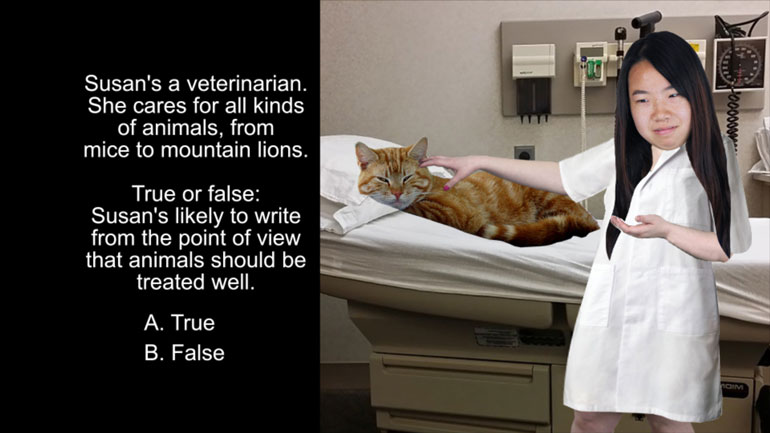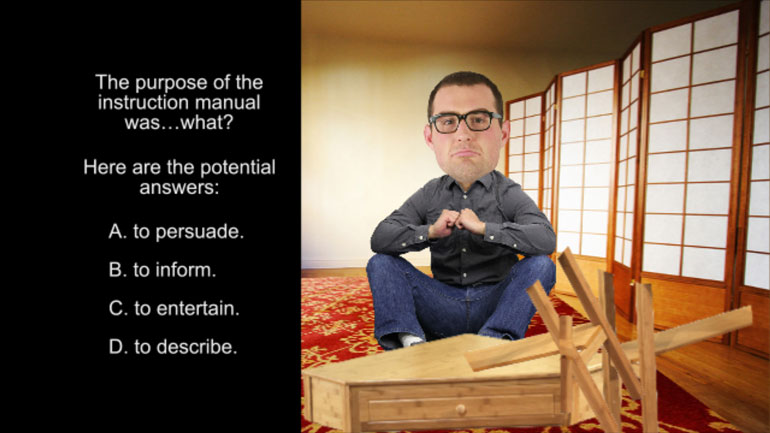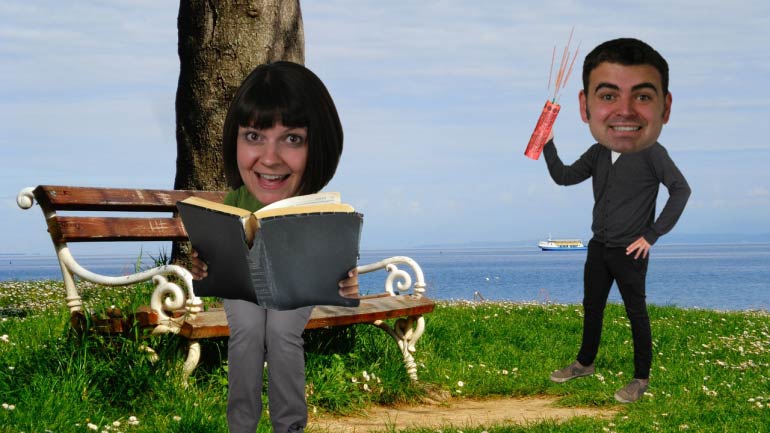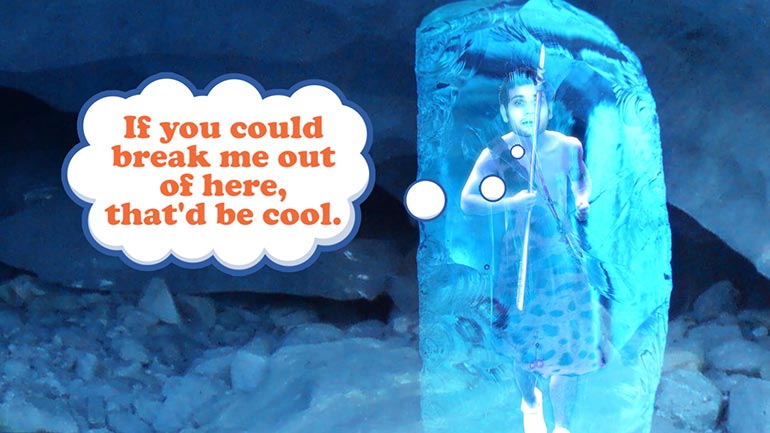ShmoopTube
Where Monty Python meets your 10th grade teacher.
Search Thousands of Shmoop Videos
Social Studies 3: Eight Ancient Inventions 53 Views
Share It!
Description:
We know, that old phone you inherited from your parents probably seems pretty ancient, but we've got eight more that are even older. Check out the video to learn more.
Transcript
- 00:04
[Coop and Dino singing]
- 00:13
Welcome to the Patent Office of Ancient Inventions, where a record is kept of every important [Records of patents]
- 00:18
discovery in the history of mankind!
- 00:21
Today, we’re taking a tour of eight ancient inventions that changed how we live.
- 00:25
And no, we won't be covering Siri in this tour. [Mom and daughter using smartphone]
Full Transcript
- 00:28
Sorry to burst your bubble.
- 00:29
We begin with the invention that helps make almost all other inventions possible: writing.
- 00:34
After years and years of frustrating trips to the grocery store … [Woman holding grocery bag]
- 00:37
… the Mesopotamians invented writing.
- 00:39
Thanks to writing, people were now able to record their history and keep records of work,
- 00:44
trade and family.
- 00:45
And, of course, make shopping lists easy to decipher.
- 00:48
It’s because of writing that people can communicate ideas across time and space.
- 00:52
Pretty nifty, eh? [Man and woman out shopping for groceries]
- 00:53
Of course, once you start writing, you need something to write on, which leads us to:
- 00:58
Paper.
- 00:59
Before paper, people wrote on stone and clay tablets, which were hard to store and move.
- 01:03
Seriously, you should've seen the paperboys back then…they were ripped. [Man throws stone onto stoop]
- 01:08
But all that changed in 100 BC, with the Chinese invention of paper.
- 01:12
And once paper was invented, ideas were able to quickly travel, allowing them to spread [Paper airplanes moving around a map]
- 01:16
to far off places with ease.
- 01:19
Further back in the Ps, we come to: the plow.
- 01:22
Apparently people in ancient Mesopotamia had a bunch of good ideas…must've been something
- 01:25
in the water…because it was a Mesopotamian farmer who invented the plow. [Farmer plowing in the field]
- 01:29
The plow allowed more planting to be done by fewer people.
- 01:32
That meant more opportunities for people to devote themselves to jobs like construction
- 01:36
and teaching.
- 01:37
It also meant more food. [Construction worker and teacher appear in the farmers field]
- 01:38
We're assuming sweatpants with elastic waistbands were invented soon after.
- 01:42
Those are a go-to at our Thanksgiving dinners.
- 01:44
Lastly in the Ps, we have Plumbing and Sewers.
- 01:47
Ha… speaking of “pee”, right?
- 01:49
Anyway, we’re back in ancient Mesopotamia, again –
- 01:52
--but this time, things were a little stinky.
- 01:54
So, they invented plumbing and sewers, which brought fresh water in and washed dirty water away. [Person drawing up sewer and plumbing designs]
- 01:58
This helped improve the health of populations living in cities.
- 02:01
Of course, now that the dirty atmosphere smell was gone, there was the small issue of being
- 02:05
able to smell each other…
- 02:06
Next up: The Lever.
- 02:08
The Greeks invented the ancient lever, which paved the way for many basic tools we use [Greek man stood beside pillars]
- 02:12
today, such as scissors, pliers, and tongs.
- 02:14
They’re all based on the idea a lever pivoting on a fulcrum to move a load.
- 02:19
If you've ever had a blast on a see-saw, you have a lever to thank! [Arrow points to see-saw]
- 02:22
…Seriously, go write it a thank you card.
- 02:24
They really appreciate the gesture. [Girl writing a thank you card]
- 02:25
Okay, card done?
- 02:27
Cool.
- 02:27
Let’s talk numbers.
- 02:28
Specifically: Zero.
- 02:29
Counting wasn’t getting very far in ancient Babylonia.
- 02:32
Literally.
- 02:32
Then someone invented zero, and everything changed.
- 02:35
Zero acts as a place holder when we get beyond nine.
- 02:39
And it allows us to count in the thousands, millions, and beyond. [Coop discussing invention of zero]
- 02:43
Which might have led to some people suddenly realizing they were rich.
- 02:46
Numbers are all well and good, but what about construction?
- 02:49
Well, that got a boost with the invention of concrete and cement!
- 02:52
The invention of hydraulic cement changed construction for good.
- 02:55
Oh, and in case you're not super up to date on your cement types, hydraulic cement gets [Man carrying bag of cement]
- 03:00
hard with the addition of water.
- 03:02
Thanks to cement, people could build taller and stronger structures than ever before.
- 03:07
And it was easier to transport than stone [Man stood beside the Colosseum]
- 03:08
Okeydoke, we’re almost through our inventions.
- 03:11
We saved the most organized for last…yup, it's our old buddy, Alphabetical Order.
- 03:16
We have ancient Egyptians to thank for this invention.
- 03:18
Alphabetical order makes it easier to organize information and find it again.
- 03:22
Not to mention, it provides a nice decoration for every classroom ever. [Alphabet decoration]
- 03:25
Phew!
- 03:26
That concludes our tour of ancient inventions.
- 03:28
Makes you wonder, what modern invention will future generations thank us for…? [Man stood with modern inventions]
- 03:32
…On second though, maybe we shouldn't think about that too hard…
Up Next
ELA Drills, Beginner: Point of View. Is the statement in the video true or false?
Related Videos
ELA Drills, Beginner: Textual Analysis 1. The purpose of the instruction manual was...what?
ELA Drills, Beginner: Point of View 3. Which sentence in the passage best shows the narrator's point of view on the topic of Chelsea Simpson?
We wanted to make a video about sedentary rocks, but we couldn't get lazy uncle Rocky off the couch. Oh well. We'll teach you about sedimentary roc...
Today we're bringing you the opposite of Jurassic Park—how living things become fossils. Okay okay, it might not be quite as fun...but hey, at le...




